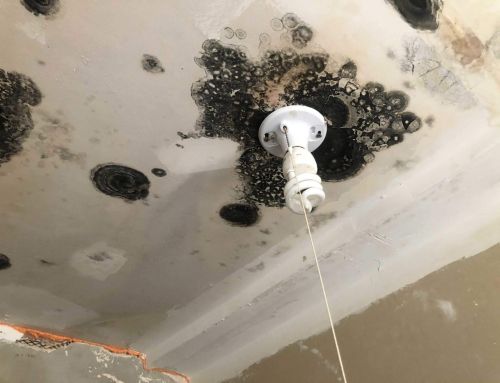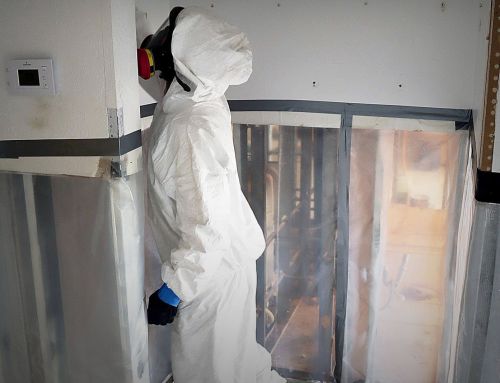When you find mold in your home, your first immediate reaction may be to deal with the problem yourself. However, cleaning up mold isn’t quite as simple as wiping up the mess and getting on with your day. Mold spores can be especially difficult to fully eradicate. If the issue isn’t fully resolved, you could end up living with an unseen contaminant that can harm your health significantly.
When dealing with mold remediation, it’s important to hire a qualified contractor for the job. Hiring a professional with mold remediation certification will ensure that your job is being performed properly and that your specialist has the skills and qualifications needed to complete the task.
The first thing a certified technician will do when assessing your issue is assign the mold contamination a level of severity. Level 1 issues are the least severe, while Level 4 mold problems affect a considerable amount of space and surface area.
Levels of Mold Remediation
When dealing with mold issues, their remediation can be broken up into four different levels of severity based on the particular size and span the issue covers.
Level 1
Level 1 mold issues are the least harmful issues that can be found. This type of remediation can sometimes be accomplished by a homeowner themselves, though it’s always wise to consult a professional to ensure that the proper steps are being taken. If you suffer from issues such as asthma, allergies, or immune deficiencies, consulting a professional is even more important. All areas should be thoroughly cleaned, and all contaminated materials should be removed from your home in a sealed plastic bag to prevent mold from spreading to any other area of your home.
Level 2
Level 2 mold contamination is slightly more severe. This involves a small contaminated area, such as a bathroom ceiling or a single wall panel. Generally, Level 2 mold issues cover anywhere from 10 to 30 square feet of area. All contaminated material should be properly covered and sealed before removing it from the affected area. Because these items can contain dust, debris, and unseen mold spores, it’s important to take extra care when removing such items from your home. Once this is completed, a professional will take the time to thoroughly vacuum the area with a HEPA vacuum to clear any additional loose debris. Finally, the area will receive one last cleaning with a damp cloth or mop.
Level 3
Level 3 mold contamination occurs when a mold issue extends within 30 to 100 square feet of a residence. Issues at this level should always be handled by a professional. Mold problems at this level require ventilation ducts within the affected area to be sealed until the issue is resolved. The affected area will be entirely vacated until the issue is resolved. Otherwise, those who come in contact with such mold spores can suffer from intense health issues. This is especially true for those with a compromised immune system.
Level 4
As you might imagine, Level 4 mold remediation is available for the most severe cases that may occur. Each of our workers is required to be trained in handling hazardous materials. Moreover, each professional is equipped with full-face respirators and protective clothing to ensure that they are protected while eradicating mold spores. Our trusted professionals at Pur360 will then create a decontamination room where any and all contaminated material will be wiped down or vacuumed before being transferred out of the residence. Before you move back into your home, our professionals will do a thorough air quality test to ensure your house is free of contaminants and once again safe to occupy.
Mold Certification Offers Peace of Mind
When you opt for hiring a qualified, certified professional for your mold remediation project, you can rest easy knowing that the issue is being thoroughly addressed and taken care of. There’s no wondering whether or not your health remains at risk after the project is completed or that the mold will return before too long. Rather, mold remediation conducted by a certified specialist comes with an added peace of mind of knowing the job is being done right.
Mold Certification Training & Requirements
To earn the title of a certified mold remediator, professionals must undergo certain certification classes and pass an exam at the end of the course. These certified professionals learn the ins and outs of mold variety and their potential harm. This is important since many types of molds respond differently to certain treatment practices. A certified inspector will take an air sample of your home to check for mold. Then, he or she will test various surfaces within your home to determine your particular mold issues and to check on the overall moisture within your home.
Invisible Contaminants Require Expert Knowledge
Clearing the visible mold from your home is far from the only issue to be resolved, however. Even if mold is entirely removed from your home, you still run the risk of having future problems if the moisture levels in your home contribute to a mold-producing environment. In order to eradicate the problem for good, a certified professional will offer a full-fledged solution to your problem that will help you prevent mold in your home for years to come. That way, you never have to worry that invisible contaminants are unknowingly harming the health of you and your family.
Hiring A Certified Mold Specialist
When searching for the right mold remediation specialist for your mold issue, it’s always wise to inquire about the particular mold inspector certification course your specialist has taken. Although any type of mold certification is better than none, not all courses are created equal. Anyone can call themselves a mold specialist, so it’s important to do your due diligence when dealing with something as dangerous as mold. If you are uncertain of a person’s certification, ask to see a copy of it. You can even reach out to the organization itself to understand more about the specific course and to ensure that the specialist you’re in contact with is, indeed, in good standing. A certified mold inspector should always follow Environmental Protection Agency guidelines, take air quality and mold samples both before and after cleanup, and be available to supervise the entire mold remediation process.
Although some states require all mold specialists to have proper certification, there are many states that do not. Selecting a certified company to perform your mold remediation job can mean the difference between whether your mold issue is properly dealt with or not. With a certified mold cleanup specialist, you can rest assured that your problem will be resolved in accordance with proper U.S. Environmental Protection Agency guidelines. Choosing a certified mold specialist takes all the guesswork out of the job.
At Pur360, we are highly experienced in providing a full range of mold remediation, testing, and sanitization services. We also offer odor removal, carpet and drywall removal and repair, light painting services, and attic stain removal. We are headquartered in the Chicago area but serve several states, including Illinois, Wisconsin, Florida, and Texas. Contact us today to set up an appointment or learn more about how selecting a certified mold remediation specialist for your project can benefit your home.



